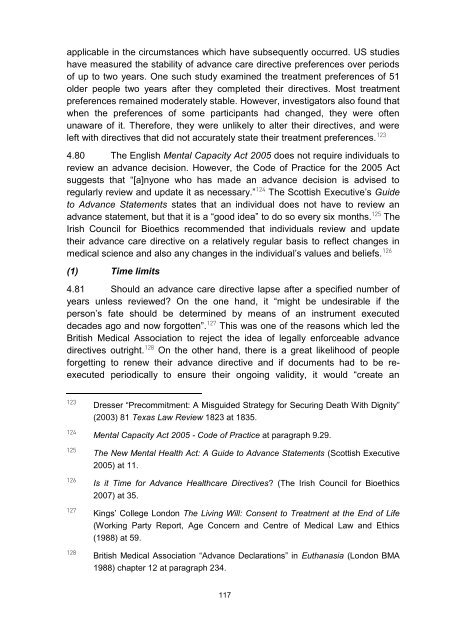Consultation Paper on Bioethics - Law Reform Commission
Consultation Paper on Bioethics - Law Reform Commission
Consultation Paper on Bioethics - Law Reform Commission
You also want an ePaper? Increase the reach of your titles
YUMPU automatically turns print PDFs into web optimized ePapers that Google loves.
applicable in the circumstances which have subsequently occurred. US studies<br />
have measured the stability of advance care directive preferences over periods<br />
of up to two years. One such study examined the treatment preferences of 51<br />
older people two years after they completed their directives. Most treatment<br />
preferences remained moderately stable. However, investigators also found that<br />
when the preferences of some participants had changed, they were often<br />
unaware of it. Therefore, they were unlikely to alter their directives, and were<br />
left with directives that did not accurately state their treatment preferences. 123<br />
4.80 The English Mental Capacity Act 2005 does not require individuals to<br />
review an advance decisi<strong>on</strong>. However, the Code of Practice for the 2005 Act<br />
suggests that “[a]ny<strong>on</strong>e who has made an advance decisi<strong>on</strong> is advised to<br />
regularly review and update it as necessary.” 124 The Scottish Executive‟s Guide<br />
to Advance Statements states that an individual does not have to review an<br />
advance statement, but that it is a “good idea” to do so every six m<strong>on</strong>ths. 125 The<br />
Irish Council for <strong>Bioethics</strong> recommended that individuals review and update<br />
their advance care directive <strong>on</strong> a relatively regular basis to reflect changes in<br />
medical science and also any changes in the individual‟s values and beliefs. 126<br />
(1) Time limits<br />
4.81 Should an advance care directive lapse after a specified number of<br />
years unless reviewed? On the <strong>on</strong>e hand, it “might be undesirable if the<br />
pers<strong>on</strong>‟s fate should be determined by means of an instrument executed<br />
decades ago and now forgotten”. 127 This was <strong>on</strong>e of the reas<strong>on</strong>s which led the<br />
British Medical Associati<strong>on</strong> to reject the idea of legally enforceable advance<br />
directives outright. 128 On the other hand, there is a great likelihood of people<br />
forgetting to renew their advance directive and if documents had to be reexecuted<br />
periodically to ensure their <strong>on</strong>going validity, it would “create an<br />
123 Dresser “Precommitment: A Misguided Strategy for Securing Death With Dignity”<br />
(2003) 81 Texas <strong>Law</strong> Review 1823 at 1835.<br />
124 Mental Capacity Act 2005 - Code of Practice at paragraph 9.29.<br />
125 The New Mental Health Act: A Guide to Advance Statements (Scottish Executive<br />
2005) at 11.<br />
126 Is it Time for Advance Healthcare Directives? (The Irish Council for <strong>Bioethics</strong><br />
2007) at 35.<br />
127 Kings‟ College L<strong>on</strong>d<strong>on</strong> The Living Will: C<strong>on</strong>sent to Treatment at the End of Life<br />
(Working Party Report, Age C<strong>on</strong>cern and Centre of Medical <strong>Law</strong> and Ethics<br />
(1988) at 59.<br />
128 British Medical Associati<strong>on</strong> “Advance Declarati<strong>on</strong>s” in Euthanasia (L<strong>on</strong>d<strong>on</strong> BMA<br />
1988) chapter 12 at paragraph 234.<br />
117

















